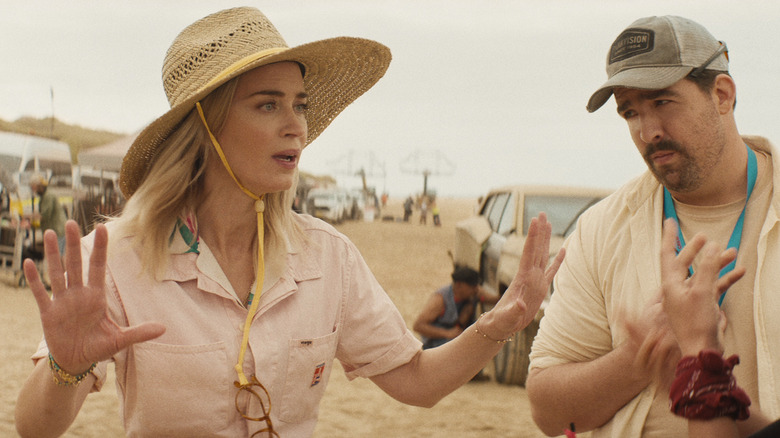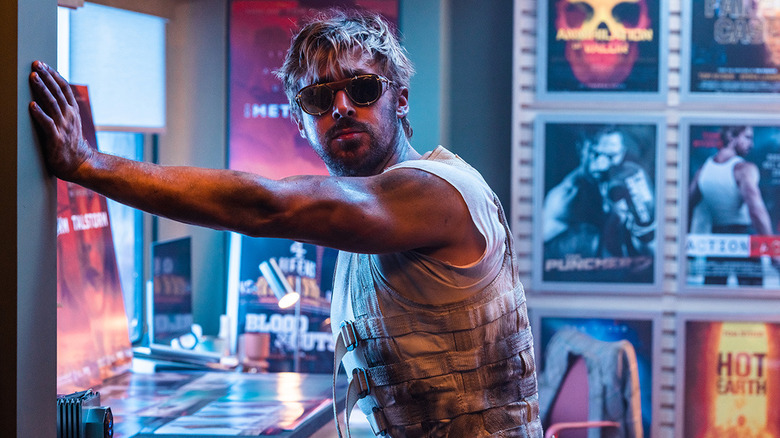The Fall Guy Falls Prey To Hollywood's Biggest Box Office Problem
After just three short weekends in theaters, Universal Pictures is pretty much pulling the plug on "The Fall Guy." The studio has announced that director David Leitch's action/comedy is available to stream on VOD as of today. Indeed, the summer blockbuster starring Ryan Gosling and Emily Blunt can now be watched from the comfort of home, effectively kneecapping its run at the box office. For those who didn't feel the need to rush out to a theater for this one, that might be welcome news. For just about everyone else? It's a sign of a much bigger problem Hollywood must contend with.
"The Fall Guy" made $8.35 million in its third weekend, coming at number four on the charts behind "The Strangers: Chapter 1" ($11.8 million), "Kingdom of the Planet of the Apes" ($25.4 million), and "IF" ($33.7 million). Leitch's adaptation of the '80s TV show has now made $62.8 million domestically and $64.5 million internationally for a running total of $127.4 million. For a big-budget, star-driven blockbuster, that's rough. That said, the film only dropped 39% from weekend two, which suggests pretty decent word of mouth and solid audience retention. In short, there is probably still money to be made in theaters in the coming weeks. Even so, the powers that be are essentially throwing in the towel and relying on VOD to make up as much ground as possible.
To summarize, "The Fall Guy" was a big bet by Universal, as the film had a final budget of $130 million (not accounting for marketing). It disappointed greatly on opening weekend and took a full two weekends to cross $100 million worldwide. Despite solid reviews and an A-list cast, it was pretty much dead on arrival. So, Universal hit the "break in case of emergency" button and decided to rush the film to VOD to try and stop the bleeding. That has, unfortunately, become standard practice in the pandemic era.
Universal is being shortsighted with its VOD strategy
Before the pandemic began, a three-month exclusive theatrical window was pretty much standard operating procedure for most big movies. If you wanted to see something when it was still new, you had to see it in a theater. In the pandemic era, even 45 days now feels like a gift for some films. Universal, dating back to "Trolls World Tour" in 2020, has been at the forefront of relying increasingly on VOD to help its films make money. Other studios have followed suit. Now, generally speaking, only movies that are seeing continued success are kept in theaters exclusively.
The box office numbers for "The Fall Guy," I would argue, provide evidence that things should be handled differently for the long-term health of the industry. We're talking about a movie that is, as it stands, a straight-up flop. No two ways about it. That being said, Universal has every motivation to try and make back as much money as possible. So sure, in some way trying to dovetail off of the theatrical release marketing to help the VOD release makes sense. Universal has argued heavily in favor of VOD in recent years, after all. But let's not forget the most important thing: people are still going to see this movie in theaters.
"Fall Guy" dropped less than 40% on its third weekend. There is audience retention happening and, if moviegoers weren't trained to understand that a movie will almost always be available at home in two or three weeks, they might be more inclined to see it in a theater. The studio could keep it in theaters and soak up every dollar they can get and demonstrate to audiences that this is a big movie that we made for theaters, so you should see it in a theater.
Universal has, instead, opted to continue to shorten that exclusive theatrical window, which was one of the main motivations many people still had to see a movie in theaters. This is wrong-headed and shortsighted, to my eyes.
The box office has to become healthy again. Period.
I understand that movies have become expensive. That's another problem entirely and certain Hollywood executives believe ticket prices need to be cheaper. I tend to agree with that. But the state of the box office — and the movie business as a whole — is a complicated mess. It's no one thing. One of the problems we must address is that moviegoing is no longer a regular habit as it once was. Making big movies available at home less than three weeks after they hit theaters isn't helping the larger cause. Maybe it helps Universal in the short term, but they need theaters to survive in the long run. The way things are going, I'm not certain anyone can confidently say the theatrical marketplace will continue to exist as it exists unless something big changes.
The box office is down more than 20% in 2024 compared to this same point in 2023. Even last year, we were still far behind pre-pandemic levels. AMC Theatres is saddled with debt. Regal's parent company is going through bankruptcy. The landscape is not promising. It doesn't help theater owners when audiences decide to stay home. Universal is making it far too easy to make that choice.
Hollywood, as a whole, has to come together to reinvest in the idea of moviegoing. Streaming has made it easier for people to stay home. VOD has made it easier for people to stay home. Big-ass 4K TVs have made it easy to stay home. People need a reason to go to the movies. The industry has to truly invest in those reasons, with theatrical exclusivity being one of them.
I'm certainly not advocating for 90-day theatrical windows again. That's a now-archaic idea. I am, however, suggesting that 45 days for a big movie is more than reasonable, especially when that movie is still making money. Yes, Universal and other studios make a lot of money from VOD these days, but at what cost? That's the bigger question.
"The Fall Guy" is (still) in theaters now.


